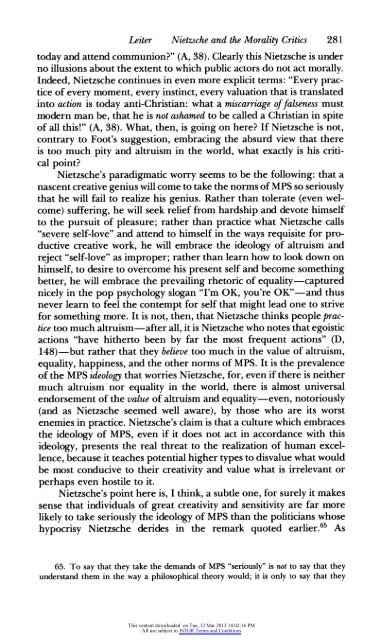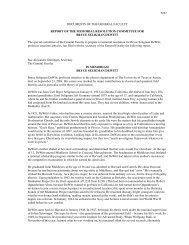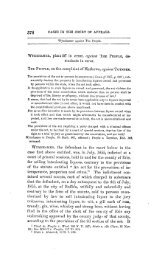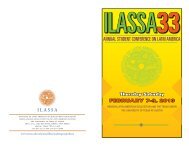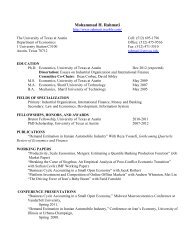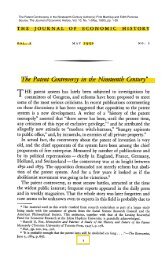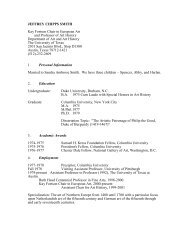Nietzsche and the Morality Critics - The University of Texas at Austin
Nietzsche and the Morality Critics - The University of Texas at Austin
Nietzsche and the Morality Critics - The University of Texas at Austin
You also want an ePaper? Increase the reach of your titles
YUMPU automatically turns print PDFs into web optimized ePapers that Google loves.
Leiter <strong>Nietzsche</strong> <strong>and</strong> <strong>the</strong> <strong>Morality</strong> <strong>Critics</strong> 281today <strong>and</strong> <strong>at</strong>tend communion?" (A, 38). Clearly this <strong>Nietzsche</strong> is underno illusions about <strong>the</strong> extent to which public actors do not act morally.Indeed, <strong>Nietzsche</strong> continues in even more explicit terms: "Every practice<strong>of</strong> every moment, every instinct, every valu<strong>at</strong>ion th<strong>at</strong> is transl<strong>at</strong>edinto action is today anti-Christian: wh<strong>at</strong> a miscarriage <strong>of</strong>falseness mustmodern man be, th<strong>at</strong> he is not ashamed to be called a Christian in spite<strong>of</strong> all this!" (A, 38). Wh<strong>at</strong>, <strong>the</strong>n, is going on here? If <strong>Nietzsche</strong> is not,contrary to Foot's suggestion, embracing <strong>the</strong> absurd view th<strong>at</strong> <strong>the</strong>reis too much pity <strong>and</strong> altruism in <strong>the</strong> world, wh<strong>at</strong> exactly is his criticalpoint?<strong>Nietzsche</strong>'s paradigm<strong>at</strong>ic worry seems to be <strong>the</strong> following: th<strong>at</strong> anascent cre<strong>at</strong>ive genius will come to take <strong>the</strong> norms <strong>of</strong> MPS so seriouslyth<strong>at</strong> he will fail to realize his genius. Ra<strong>the</strong>r than toler<strong>at</strong>e (even welcome)suffering, he will seek relief from hardship <strong>and</strong> devote himselfto <strong>the</strong> pursuit <strong>of</strong> pleasure; ra<strong>the</strong>r than practice wh<strong>at</strong> <strong>Nietzsche</strong> calls"severe self-love" <strong>and</strong> <strong>at</strong>tend to himself in <strong>the</strong> ways requisite for productivecre<strong>at</strong>ive work, he will embrace <strong>the</strong>, ideology <strong>of</strong> altruism <strong>and</strong>reject "self-love" as improper; ra<strong>the</strong>r than learn how to look down onhimself, to desire to overcome his present self <strong>and</strong> become somethingbetter, he will embrace <strong>the</strong> prevailing rhetoric <strong>of</strong> equality-capturednicely in <strong>the</strong> pop psychology slogan "I'm OK, you're OK"-<strong>and</strong> thusnever learn to feel <strong>the</strong> contempt for self th<strong>at</strong> might lead one to strivefor something more. It is not, <strong>the</strong>n, th<strong>at</strong> <strong>Nietzsche</strong> thinks people practicetoo much altruism-after all, it is <strong>Nietzsche</strong> who notes th<strong>at</strong> egoisticactions "have hi<strong>the</strong>rto been by far <strong>the</strong> most frequent actions" (D,148)-but ra<strong>the</strong>r th<strong>at</strong> <strong>the</strong>y believe too much in <strong>the</strong> value <strong>of</strong> altruism,equality, happiness, <strong>and</strong> <strong>the</strong> o<strong>the</strong>r norms <strong>of</strong> MPS. It is <strong>the</strong> prevalence<strong>of</strong> <strong>the</strong> MPS ideology th<strong>at</strong> worries <strong>Nietzsche</strong>, for, even if <strong>the</strong>re is nei<strong>the</strong>rmuch altruism nor equality in <strong>the</strong> world, <strong>the</strong>re is almost universalendorsement <strong>of</strong> <strong>the</strong> value <strong>of</strong> altruism <strong>and</strong> equality-even, notoriously(<strong>and</strong> as <strong>Nietzsche</strong> seemed well aware), by those who are its worstenemies in practice. <strong>Nietzsche</strong>'s claim is th<strong>at</strong> a culture which embraces<strong>the</strong> ideology <strong>of</strong> MPS, even if it does not act in accordance with thisideology, presents <strong>the</strong> real thre<strong>at</strong> to <strong>the</strong> realiz<strong>at</strong>ion <strong>of</strong> human excellence,because it teaches potential higher types to disvalue wh<strong>at</strong> wouldbe most conducive to <strong>the</strong>ir cre<strong>at</strong>ivity <strong>and</strong> value wh<strong>at</strong> is irrelevant orperhaps even hostile to it.<strong>Nietzsche</strong>'s point here is, I think, a subtle one, for surely it makessense th<strong>at</strong> individuals <strong>of</strong> gre<strong>at</strong> cre<strong>at</strong>ivity, <strong>and</strong> sensitivity are far morelikely to take seriously <strong>the</strong> ideology <strong>of</strong> MPS than <strong>the</strong> politicians whosehypocrisy <strong>Nietzsche</strong> derides in <strong>the</strong> remark quoted earlier.65 As65. To say th<strong>at</strong> <strong>the</strong>y take <strong>the</strong> dem<strong>and</strong>s <strong>of</strong> MPS "seriously" is not to say th<strong>at</strong> <strong>the</strong>yunderst<strong>and</strong> <strong>the</strong>m in <strong>the</strong> way a philosophical <strong>the</strong>ory would; it is only to say th<strong>at</strong> <strong>the</strong>yThis content downloaded on Tue, 12 Mar 2013 14:02:16 PMAll use subject to JSTOR Terms <strong>and</strong> Conditions


